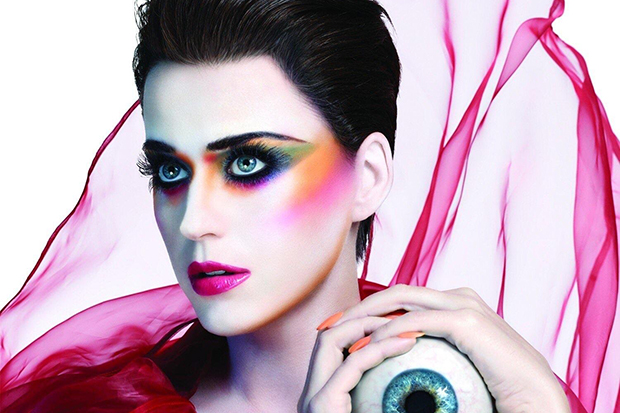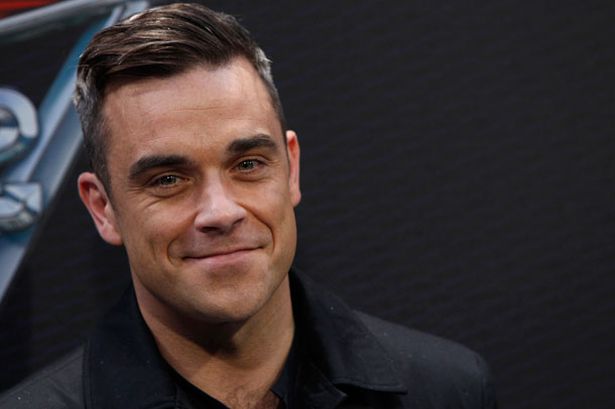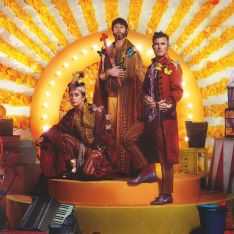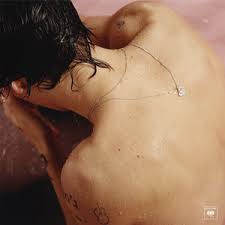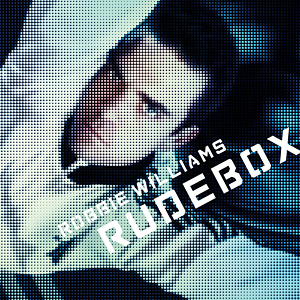
Every artist is responsible for at least one dud album in their career. Whether its due to misjudgement of genre, poor selection of material or simply an identity crisis, every artist, no matter how credible has had their moment. It’s impossible and unrealistic to expect an artist to consistently produce an output of quality material, particularly over a long career.
Many consider Robbie Williams’s ‘dud’ moment to be ‘Rudebox’; his experimental, genre-hopping ‘wonky’ seventh album. It’s an album wrongly but most commonly judged by and remembered for its ill-judged release of the title track and the lack of Guy Chambers’ presence. Yet, given a chance, ‘Rudebox’ is an under-valued and underrated inclusion in Williams’ extensive discography. Over a decade later, it’s still his most endearing and experimental work and certainly holds the test of time with its electronic basis.
‘Rudebox’ was released in October 2006, just a year after Williams’ previous release, the well intentioned but uninspiring ‘Intensive Care’. ‘Intensive Care’ was a notable album for Williams, being the first which lacked the writing credits and production duty of Guy Chambers following a bitter and very public falling out. New collaborator Stephen Duffy tried his utmost best to fill his shoes but just stopped short of doing so. Together, the duo produced an album which was a testament to Robbie’s love of 80’s Pop. It was a brave and worthwhile attempt but aside from its strong selection of singles, the remainder of the album was simply filler and not much else.
‘Rudebox’ was Take 2 of encapsulating Robbie’s influences in an album and this time was a far more substantial effort. At a whopping 73 minutes and 16 tracks long and worked on with various writers, musicians and producers, the album was a bold statement from the outset. Rather than attempt to replace Chambers with a new writer/producer partner, this time, Williams embraced his newly found freedom and worked with whoever he bloody well wanted to work with. The result was a genre-hopping, brash album which covered Hip-Hop, R&B, Electronica, Pop, electropop, funk amongst many others. The album also featured the inclusion of 5 covers, a rarity for Williams.
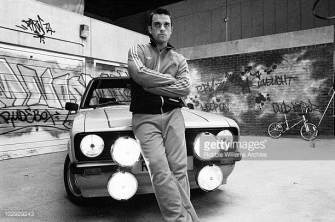 The album got off to a shaky start when a newly-reformed Take That decided to resurrect their career around the time of the ‘Rudebox’ era. Where Take That had the stunning Barlow-ballad ‘Patience‘ which was warmly received by the public and didn’t stray too far from their signature sound, Robbie offered ‘Rudebox‘, an unorthodox venture into Pop/Hip-Hop. Williams’ image hardly represented this image and brand and the single was panned by critics with its cultural references and Williams’ incongruous attempt at rapping. The single fared well in the UK singles chart but is perhaps best summarised by Williams who once referred to it as being “made to feel as welcome as a ginger step child”. In hindsight, ‘Rudebox‘ wasn’t necessarily the wisest choice of lead single on a credibility level but it certainly generated discussion and a buzz around the album.
The album got off to a shaky start when a newly-reformed Take That decided to resurrect their career around the time of the ‘Rudebox’ era. Where Take That had the stunning Barlow-ballad ‘Patience‘ which was warmly received by the public and didn’t stray too far from their signature sound, Robbie offered ‘Rudebox‘, an unorthodox venture into Pop/Hip-Hop. Williams’ image hardly represented this image and brand and the single was panned by critics with its cultural references and Williams’ incongruous attempt at rapping. The single fared well in the UK singles chart but is perhaps best summarised by Williams who once referred to it as being “made to feel as welcome as a ginger step child”. In hindsight, ‘Rudebox‘ wasn’t necessarily the wisest choice of lead single on a credibility level but it certainly generated discussion and a buzz around the album.
Just weeks later, the album was the subject of great controversy when Williams and ex-Take That manager Nigel Martin-Smith became embroiled in yet another feud. Martin-Smith instigated legal action over the lyrical content present in ‘The 90’s‘, in which Robbie accused his ex-manager of pocketing profits:
Now I’m managed by a prick And I’m sixteen and chubby
Told me lose twenty pounds and you’re not Rob, you’re Robbie And if I see you with a girl then you’re gonna be sorry And if you don’t sign this contract get your bags from the lobby Such an evil man I used fantasise and take a Stanley knife and go and play with his eyes I pray to the lord he won’t have any children, he didn’t spot Elvis leaving the building
Martin-Smith pocketed £300,000 for defamation of character, though the track remained, albeit with the offending verse removed and an instrumental break in its place.
Despite blurred reception to early promo of the album and the Martin-Smith controversy, Williams maintained his belief in his newly developed sound at the time:
“It has become something on which I’ve found myself. This is the right direction for me personally, this is what it is. I saw the whole Robbie thing coming to a close as it was, I couldn’t make another album like the ones I’d made, and this has just opened up a thousand other doors. What I am excited about now is making more music. I love all the stuff on the album, I love Rudebox, it’s a favourite song of mine. I don’t know what’s gonna happen now, I’m excited about getting it out there, but I’m more excited about making more.”
– Robbie Williams speaking of the album prior to its release
At times, ‘Rudebox‘ is best enjoyed with a tongue-in-cheek attitude whilst at others it can be enjoyed with genuine credibility. The non compos mentis approach to the title track continues through to the likes of ‘Keep On‘, an exceptionally fun but absurd pop track featuring the vocals of Lily Allen and genius production of Mark Ronson. It’s a chaotic and neurotic track on which Robbie raps over a cacophony of hip hop beats, giggling synthesizers and blues-esque guitars. Likewise, the self-deprecating nature of ‘Good Doctor‘ with its quirky jazz and tight percussion is another tongue in cheek moment a genius insight into Williams’ life. It’s Williams at his best as a wordsmith, with lines such as:
I went to the doctor to get a prescription
I told him little fact but lots of fiction
About a bad back that I ain’t got
He tried to sell me faith healing, I think not
I want Xanax, Vicodin and Oxycontin
Then, there’s the quirky, western-techno suffused ‘Viva Life On Mars‘, the tropical-soul of ‘Bongo Bong and Je ne t’aime plus‘ (a cover of two songs originally by Manu Chao) and the flat electronica of ‘Burslem Normals‘ (which after Rudebox, is probably the second worst track on the album).
On the whole, however, the album can be enjoyed on a far more credible level. ‘Lovelight‘ is one of the album’s highlights. A cover of Lewis Taylor’s 2003 funk track, Robbie’s gentle falsetto vocals in addition to Mark Ronson’s golden touch of production makes it a shimmering pop moment. It’s still a brilliant track and remains one of Robbie’s most underrated works.
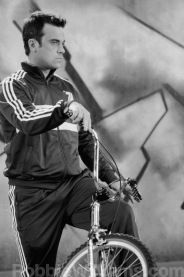 Likewise, the Pet Shop Boys collaboration ‘She’s Madonna‘ is pure genius and a prod at Guy Ritchie leaving ex-girlfriend Tania Strecker for the pop superstar. Madge herself was reportedly fond of the track and it is without a doubt one of the album’s finest moments, if not, its best. Had this been released as lead single instead of the title track, the album may be remembered more fondly. Musically inspired by Kraftwerk’s 1983 single ‘Tour De France‘, The Pet Shop Boys’ electronic production is flawless and the accompanying music video (which featured Williams as a drag queen) is similarly as endearing. Even this track couldn’t escape controversy, however when Ashley Hamilton (co-writer of Robbie’s earlier smash hit ‘Come Undone‘) claimed to have co-written the track but hadn’t received any credit.
Likewise, the Pet Shop Boys collaboration ‘She’s Madonna‘ is pure genius and a prod at Guy Ritchie leaving ex-girlfriend Tania Strecker for the pop superstar. Madge herself was reportedly fond of the track and it is without a doubt one of the album’s finest moments, if not, its best. Had this been released as lead single instead of the title track, the album may be remembered more fondly. Musically inspired by Kraftwerk’s 1983 single ‘Tour De France‘, The Pet Shop Boys’ electronic production is flawless and the accompanying music video (which featured Williams as a drag queen) is similarly as endearing. Even this track couldn’t escape controversy, however when Ashley Hamilton (co-writer of Robbie’s earlier smash hit ‘Come Undone‘) claimed to have co-written the track but hadn’t received any credit.
‘The Actor‘ is in a similar vein to ‘She’s Madonna‘ but far darker in tone, documenting Williams’ dissatisfaction with celebrity culture and most notably, egotistical Hollywood superstars over a squeaky electronic track. ‘Never Touch That Switch‘ is a similarly filthy and paranoia-tinged electro track.
Overall, the covers present on the album also work well. ‘Kiss Me‘, a cover of Tin Tin’s 1982 single (previous Williams collaborator Stephen Duffy was a member of the band) is a flamboyant electro interpretation whilst ‘Louise‘ is a loyal and tasteful cover of the Human League track, with added gloss and fizz courtesy of genius William Orbit (responsible for the likes of All Saints’ ‘Pure Shores‘.) ‘We’re The Pet Shop Boys‘ is plastered with self-indulgent humour as Williams enlists The Pet Shop Boys to produce a track originally released by My Robot Friend as a tribute to the duo.
Two of the album’s most surprising highlights are ‘The 80’s’, and ‘The 90’s’. These tracks are two bookends documenting Robbie’s experiences as a teenager in the 1980’s and of his rise to fame in Take That during the 1990’s. Out of the two tracks, ‘The 90‘s is superior, an astoundingly frank recollection of Williams’ time in Take That. Unlike his previous digs at his boy-band roots, this track would prove to be the first time he reflected on his past with far greater maturity than demonstrated previously and saw Williams finally accepting some responsibility for his bitter fall out:
And now it’s breaking my heart because the dream’s turned to shit
It ain’t broke but I’ll break it in a little bit
And I’m always in trouble but I’ve stopped saying sorry
Everybody’s worried, “What the fuck’s wrong with Robbie?
He’s not answering his phone, he’s not talking to me
I saw him on the telly at Glastonbury.”
And now I’m running away from everything that I’ve been
And I’m pissed and I’m fucked and I’m only nineteen
I can’t perform no more, I can’t perform no more
But the boys know I’m fucked and so they show me the door
And if truth be told I wasn’t fit enough to stay
So I put me head down and walked away.
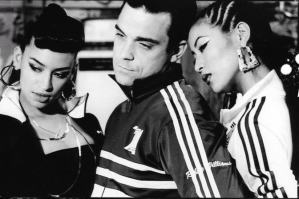 Originally written over one of Williams’ favourite songs, ‘Wichita Lineman‘ by Glen Campbell, Jerry Meehan later re-wrote the song musically to remove the sample. It’s a stark reminder of what a brilliant wordsmith Williams is – his ability to tell a story through music is compelling as ever on this track.
Originally written over one of Williams’ favourite songs, ‘Wichita Lineman‘ by Glen Campbell, Jerry Meehan later re-wrote the song musically to remove the sample. It’s a stark reminder of what a brilliant wordsmith Williams is – his ability to tell a story through music is compelling as ever on this track.
The album comes to a close with the serenity of ‘Summertime‘, a song written when Williams first left Take That and featured in a different form years earlier during the credits of ‘Mike Bassett: England Manager’. William Orbit’s makeover makes it an ambient, summery anthem and a fitting close to the album. Well, that’s until the grime-pop of ‘Dickhead‘ begins. But the less said about that, the better.
‘Rudebox’ was Williams breaking out of the mould he’d unwittingly trapped himself in and him having the balls to make the album he wanted to make. It’s bold, brash and bloody brilliant and still as endearing as ever almost eleven years later.

